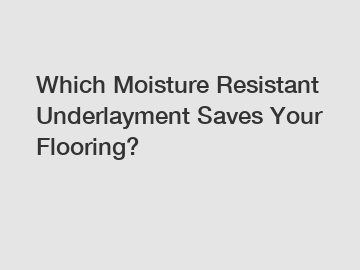Which Moisture Resistant Underlayment Saves Your Flooring?
Which Moisture Resistant Underlayment Saves Your Flooring?
Moisture damage is a nightmare for any homeowner. Water can seep into the flooring and cause warping, mold growth, and structural issues. That's why it's crucial to invest in a moisture-resistant underlayment to protect your flooring from potential damage. But which moisture-resistant underlayment should you choose? Let's explore the options and discover the best solution for your needs.
1. Plywood: .

Traditional plywood is a cost-effective and commonly used underlayment material. It provides some level of moisture resistance, as long as it is properly sealed. However, plywood is not the most effective solution when it comes to high-moisture areas such as basements or bathrooms. Over time, plywood can still absorb and retain moisture, potentially causing damage to your flooring.
2. Cement Board:
Cement board is another popular choice for moisture-resistant underlayment. Made from a combination of cement and reinforcing fibers, it offers excellent resistance to moisture while providing a stable base for different types of flooring. Cement board is especially suitable for areas prone to high humidity, such as bathrooms and kitchens. However, it can be heavy, making installation a bit labor-intensive.
3. Vinyl Underlayment:
Vinyl underlayment is specifically designed to withstand moisture, making it an ideal option for areas prone to water exposure. With its waterproof properties, it effectively shields your flooring from potential damage caused by water or moisture. Vinyl underlayment is lightweight and easy to install, making it a popular choice among DIY enthusiasts. It is also compatible with various types of flooring, including laminate, vinyl, and engineered wood.
4. Rubber Underlayment:
Rubber underlayment is another moisture-resistant option worth considering. It acts as a barrier, preventing moisture from penetrating your flooring. Rubber underlayment is known for its excellent sound insulation and cushioning properties, making it a perfect choice for multi-story buildings or areas where sound absorption is essential. However, rubber underlayment tends to be more expensive compared to other options.
Conclusion:
When it comes to choosing a moisture-resistant underlayment, it's crucial to consider the specific needs of your environment. If you're dealing with a high-moisture area such as a basement or bathroom, investing in a more advanced solution like vinyl underlayment is recommended. Vinyl underlayment provides superior protection against moisture and is compatible with various flooring types. For areas prone to humidity but with less exposure to direct moisture, cement board can be an excellent choice due to its sturdiness.
While traditional plywood offers some degree of moisture resistance, it may not be the most effective option for areas with high moisture levels. Rubber underlayment is a premium choice, especially for those looking for sound insulation benefits in addition to moisture resistance.
Ultimately, weighing the pros and cons of each option will help you make an informed decision. Consider factors such as your budget, the level of moisture exposure, and the type of flooring you're using. Don't compromise on the well-being of your flooring – invest in a moisture-resistant underlayment that will ensure its longevity and appearance for years to come.
So, which moisture-resistant underlayment will save your flooring? The answer lies in your specific needs and preferences. Evaluate your environment and choose the option that offers the best balance between moisture resistance, affordability, and compatibility with your flooring type. By making an informed decision, you can protect your investment and enjoy a beautifully resilient floor for years to come.
Want more information on Cement Based Self-Leveling Compound| High Performance, Self Leveling Compound Basecoat Primer, Self-Leveling Compound Manufacturer? Feel free to contact us.
102
0
0


Comments
All Comments (0)